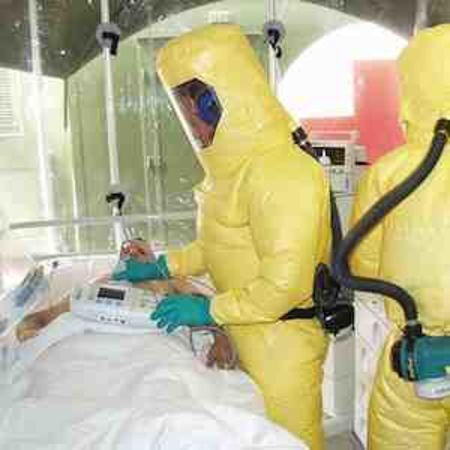When the European Society of Intensive Care Medicine met in Barcelona for LIVES 2014, Mitchell Levy, Professor of Medicine, Brown University, Rhode Island, received a worrying text message from his son. “Dad, answer the phone, I think I’m in trouble”, it said simply. As his son was working in Liberia during the Ebola crisis, Levy immediately took action. He was in a meeting of the Surviving Sepsis Campaign at the time, and was able to get the names of two doctors on the ground, Shrinivas Murthy and Shevin Jacob, who advised him on how to get through the red tape of the consulate so he could get his son urgently evacuated to the United States.
One year on from the crisis, Levy shared the lessons he learned from. His son made a full recovery, and Levy has been able to reflect on the experience of being in a very public spotlight. He drew particular attention to the inflammatory news reports, which showed poor knowledge of Ebola and presented the illness as uniformly fatal.
Levy spoke of his uncertainty, fear and isolation and of the many questions that worried him - Will I get him out? Who should I call? Should I be talking to the press? Who’s going to pay for the evacuation?
As he started the process of talking to the consulate staff, he reminded everyone he talked to that their conversation would be replayed in the press. He recalled that the consulate physician’s first question was “How did you get my phone number?” followed by “We don’t have the results of his test yet.” Levy insisted that his son be evacuated immediately. He noted the disconnect between his angst about his son and the impersonal behaviour of the physician, who was not unkind but not invested in his son like his father was. An airlift was arranged within 72 hours. Levy observed that if he was just the “usual” family member, that physician would have insisted that they wait until the test was positive, even though there is a high rate of false negatives in the first 24-48 hours.
Levy thanked his colleagues for their support during this time, and was keen to thank ESICM in 2015 for keeping him and his family in their thoughts.
Levy closed by saying that intensivists say and teach that they should treat all patients like they are your family members, but in the busy chaotic environment of the ICU, it's easy to forget what people feel like when they’re lying in that bed. “We must always aspire to remember what it feels like to be on the other side”, he said.
Claire Pillar
Managing editor, ICU Management
Image source: Pixabay
One year on from the crisis, Levy shared the lessons he learned from. His son made a full recovery, and Levy has been able to reflect on the experience of being in a very public spotlight. He drew particular attention to the inflammatory news reports, which showed poor knowledge of Ebola and presented the illness as uniformly fatal.
Levy spoke of his uncertainty, fear and isolation and of the many questions that worried him - Will I get him out? Who should I call? Should I be talking to the press? Who’s going to pay for the evacuation?
As he started the process of talking to the consulate staff, he reminded everyone he talked to that their conversation would be replayed in the press. He recalled that the consulate physician’s first question was “How did you get my phone number?” followed by “We don’t have the results of his test yet.” Levy insisted that his son be evacuated immediately. He noted the disconnect between his angst about his son and the impersonal behaviour of the physician, who was not unkind but not invested in his son like his father was. An airlift was arranged within 72 hours. Levy observed that if he was just the “usual” family member, that physician would have insisted that they wait until the test was positive, even though there is a high rate of false negatives in the first 24-48 hours.
Levy thanked his colleagues for their support during this time, and was keen to thank ESICM in 2015 for keeping him and his family in their thoughts.
Levy closed by saying that intensivists say and teach that they should treat all patients like they are your family members, but in the busy chaotic environment of the ICU, it's easy to forget what people feel like when they’re lying in that bed. “We must always aspire to remember what it feels like to be on the other side”, he said.
Claire Pillar
Managing editor, ICU Management
Image source: Pixabay
Latest Articles
Ebola virus, #lives2015, ESICM 2015
Mitchell Levy reflects on his experiences when his son was evacuated from Liberia after being infected with the Ebola virus



























